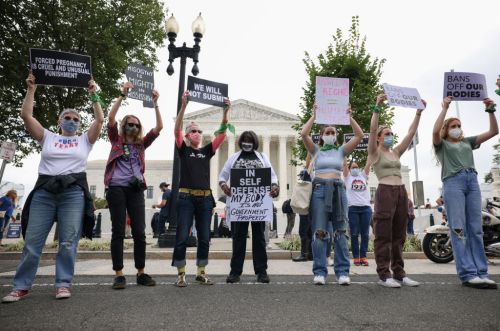How, Exactly, To Make Your Voice Heard About the Overturning of Roe v. Wade
An abortion justice advocate offers four tangible action items for how to protect 'Roe v. Wade,' or support a post-Roe world.

On June 24 with a 5-4 majority opinion, the Supreme Court overturned Roe v. Wade, the 1973 Supreme Court case that protects abortion under the 14th amendment. As many come to grips with the fact that the national right to a safe and legal abortion has slipped away, you may be asking yourself: “What’s next?”
Experts in This Article
Sharmin Hossain is a Bangladeshi-American queer Muslim project manager, political consultant, design strategist and artist, from Queens, New York. She is the Campaign Director of the Liberate Abortion Campaign, crafting a bold, new vision for abortion justice—regardless of a Supreme Court decision—that is intersectional and future-focused. She manages the coalition more than 150 reproductive justice and rights organizations, groups, and abortion providers working in coalition to fight for abortion that is available, affordable, accessible, and stigma-free for anyone who needs it.
The ruling means that reproductive rights will be kicked back to the state level. As a result, safe abortions will quickly become severely restricted or illegal for more than 135 million people, according to NPR. And 13 states have even passed “trigger laws,” or pre-Roe abortion bans that will start the moment the court makes its decision, banning abortion within 30 days, leaving many folks without the health care they need.
The effects of a post-Roe v. Wade world will be devastating and expansive. One in four women in the U.S. is expected to get an abortion, and for many, that decision is fundamental to their life’s course. They make the decision to pursue their education so that they can funnel their resources to their existing family members, or because they can’t afford a child (among other reasons).
You aren’t alone if you feel frustrated and restless right now. Below, Sharmin Hossain, abortion justice advocate, Campaign Director of the Liberate Abortion Campaign, and Well+Good Changemaker offers her best advice for supporting reproductive rights.
How to protect Roe v. Wade and reproductive rights at large
1. Donate to abortion access funds
Your money can go a long way right now, so Hossain strongly urges you to donate to abortion access funds if you’re financially able. People will need transportation, time off work, and cash flow to travel if and when they need an abortion. Your money can ensure they get there safely and without emptying their wallets in the process.
“Everybody should move money towards abortion through the National Network of Abortion Funds,” says Hossain. “One of the critical ways of supporting people seeking access to care is by making sure they have the money and the resources to access that care. So abortion funds fill that critical gap.”
Hossain also recommends donating to Keep Our Clinics, a campaign spearheaded by the Abortion Care Network that raises money for independent abortion clinics (the largest providers of abortion in the country).
To aid a specific state-level abortion fund, head here and select the state or states you’d like to send your donation.
2. Protest
Hossain also recommends taking to the streets. People have been protesting for thousands of years for a reason: The action creates a collective human voice on a shared issue and motivates authority figures to consider or change their actions.
3. Make sure your community still knows that Roe v. Wade is intact
Part of caring for your community means making sure they understand what’s going on. So talk to loved ones about the decision, make sure they know where their abortion rights and access points stand, and use inclusive, non-harmful language as you do. “People are often quick to use a coat hanger imagery or old school anecdotes about the horrors of abortion,” says Hossain. “Although that is the truth for many people pre-Roe, I think that those references are actually stigmatizing.”
It’s also a good idea to watch your use of pronouns and remember that people of all gender identities are affected by this news. “We really need to focus on opening up the language to not only be more gender-inclusive, but to include how queer people that are now have been attacked by trans exclusionary laws are also a part of this attack on reproductive rights,” she says.
4. Volunteer on a local level
There’s a lot you can do within your neighborhood to protect abortion rights. Volunteer to escort folks to your local abortion clinic,become a talkline advocate for people weighing their reproductive options, or find an abortion clinic office where you can volunteer.
Oh hi! You look like someone who loves free workouts, discounts for cutting-edge wellness brands, and exclusive Well+Good content. Sign up for Well+, our online community of wellness insiders, and unlock your rewards instantly.
Sign Up for Our Daily Newsletter
Get all the latest in wellness, trends, food, fitness, beauty, and more delivered right to your inbox.
Got it, you've been added to our email list.








